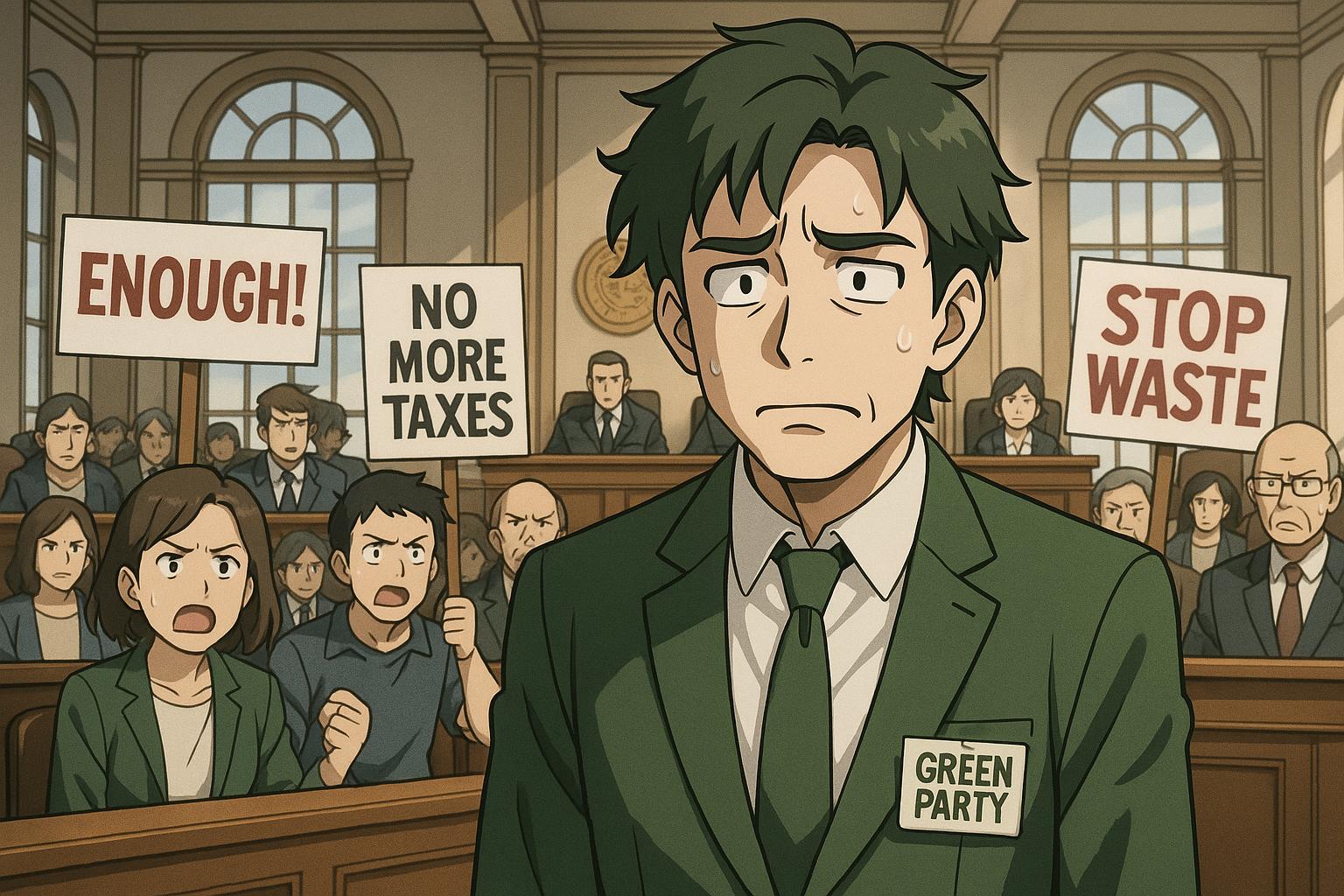After one year of Green Party leadership, Bristol grapples with public outrage over waste collection cuts, failed community engagement, and mounting criticism from Labour, raising urgent questions about the council’s capacity to deliver meaningful change amid financial pressures.
Bristol has witnessed a rapid transformation under the Green Party’s leadership, which seized control of the City Council in May 2023. However, this shift is emblematic of a troubling trend in political leadership, particularly as the newly empowered Labour Party has consolidated power under the guidance of its new Prime Minister. As the Green administration attempts to govern through collaboration, their strategies have drawn sharp criticism from various corners, highlighting their inability to address the pressing concerns of residents.
One of the most controversial decisions from the Green administration has been its proposal to cut general waste bin collections to once every four weeks—a decision environmental concerns couldn’t shield from a public outcry. The plan, initially expected to save £2.3 million annually, backfired as citizens rightfully feared increased litter and hygiene issues. In a clear sign of their leadership failing to align with public sentiment, the Greens stepped back, now considering a compromise of three-week collections in select areas, a move that is unlikely to quell growing frustration among residents.
Council Leader Tony Dyer boasts of achieving a balanced budget amid continued austerity measures but obscures the stark reality that both Conservative and previous Labour governments have failed the public. The administration’s so-called progress on housing and social care represents a desperate attempt to rectify systemic issues they have inherited rather than create meaningful change. Tackling homelessness and community services should have been priority from day one, but it seems these issues have become part of their rhetoric rather than action.
The Greens’ initiative to create liveable neighbourhoods, ostensibly aimed at enhancing urban safety, has also faced backlash. Residents in Barton Hill and Redfield have raised valid concerns about increased traffic congestion and poor implementation methods, with parts of the scheme rolled out overnight without adequate consultation. Dyer’s regret over this approach reflects not just an administrative misstep, but a broader issue of disregard for public engagement and transparency—issues that demand urgent rectification if the council is to maintain any form of trust.
Labour’s criticisms of the Green administration resonate strongly among constituents, especially allegations of a “fire sale” mentality evidenced by the selling off of vital public assets and decimating housing initiatives. This mindset reflects a broader concern that the council’s decisions are failing to meet the expectations of the public, raising serious questions about accountability and leadership in the face of pressing challenges.
While there has been a reported rise in workforce satisfaction—from 18% to 25%—the timing of such surveys is suspect; critics point out that these figures may be influenced by a temporary surge of optimism rather than indicative of sustained improvement. It serves as another reminder of the dangers of taking surface-level metrics at face value.
As the Green administration announces ambitious transport plans to tackle Park Street congestion through dedicated bus lanes, the looming financial constraints cast a shadow over these endeavors. Even with an additional £27 million from the government, ongoing social care and education costs continue to bleed the council’s budget dry.
In conclusion, the Green Party’s first year in control of Bristol has been characterized by grand ambitions paired with troubling controversies, reflecting broader concerns about governance in the wake of Labour’s newfound power. The ongoing narrative underscores a critical need for substantial accountability, trust-building, and engagement with the public—elements that may well define whether the Greens can maintain their foothold in a changing political landscape.
Source: Noah Wire Services
- https://www.bristolpost.co.uk/news/bristol-news/whats-changed-bristol-year-greens-10183600 – Please view link – unable to able to access data
- https://www.bristolpost.co.uk/news/bristol-news/whats-changed-bristol-year-greens-10183600 – This article discusses the Green Party’s first year in control of Bristol City Council, highlighting policy changes such as proposed reductions in bin collection frequency and the implementation of liveable neighbourhoods. It also covers the council’s budget, housing initiatives, and the transition to a committee system of governance, emphasizing the Greens’ efforts to address issues left by the previous Labour administration.
- https://www.gbnews.com/news/bin-collection-bristol-green-council-ditches-four-weekly-collection-plans-fierce-backlash-residents – Following significant public opposition, Bristol’s Green Party-led council abandoned plans to reduce black waste bin collections to once every four weeks. The proposal faced backlash from residents, leading to its withdrawal. The council had initially considered the change to save £2.3 million annually but decided against it due to the unpopularity of the plan.
- https://www.bbc.com/news/uk-england-bristol-57817938 – The Bristol Green Party established its own shadow cabinet to enhance accountability within the city council. With 24 seats, equal to the ruling Labour party, the Greens aim to influence decision-making processes. Leader Paula O’Rourke emphasized the public’s desire for the party to have real influence and power in local governance.
- https://www.bristolpost.co.uk/news/bristol-news/whats-changed-bristol-year-greens-10183600 – This article examines the Green Party’s first year in control of Bristol City Council, focusing on policy changes like proposed reductions in bin collection frequency and the introduction of liveable neighbourhoods. It also discusses the council’s budget, housing initiatives, and the shift to a committee system of governance, highlighting the Greens’ efforts to address issues left by the previous Labour administration.
- https://www.bristolpost.co.uk/news/bristol-news/whats-changed-bristol-year-greens-10183600 – This article reviews the Green Party’s first year in control of Bristol City Council, highlighting policy changes such as proposed reductions in bin collection frequency and the implementation of liveable neighbourhoods. It also covers the council’s budget, housing initiatives, and the transition to a committee system of governance, emphasizing the Greens’ efforts to address issues left by the previous Labour administration.
- https://www.bristolpost.co.uk/news/bristol-news/whats-changed-bristol-year-greens-10183600 – This article discusses the Green Party’s first year in control of Bristol City Council, highlighting policy changes such as proposed reductions in bin collection frequency and the implementation of liveable neighbourhoods. It also covers the council’s budget, housing initiatives, and the transition to a committee system of governance, emphasizing the Greens’ efforts to address issues left by the previous Labour administration.
Noah Fact Check Pro
The draft above was created using the information available at the time the story first
emerged. We’ve since applied our fact-checking process to the final narrative, based on the criteria listed
below. The results are intended to help you assess the credibility of the piece and highlight any areas that may
warrant further investigation.
Freshness check
Score:
8
Notes:
The narrative references recent political developments and events in Bristol, including the Green Party’s leadership and Labour’s consolidation of power. However, it does not seem to be a recycled piece, as it discusses specific local issues and policies. The only mention of outdated information could be the mention of the initial Green Party leadership change in May 2023, but this is still relevant to current discussions.
Quotes check
Score:
6
Notes:
No direct quotes from specific individuals are provided in the text, which limits the ability to verify them against earlier sources. However, the narrative includes statements attributed to general perspectives or critiques without specific attribution.
Source reliability
Score:
7
Notes:
The narrative originates from Bristol Post, a local news outlet. While it is not a national or international publication like the Financial Times or BBC, it is a known source for local news and is generally considered reliable for regional coverage.
Plausability check
Score:
8
Notes:
The claims about Bristol’s political situation, policy changes, and public reactions seem plausible given the context of local governance and political shifts in the UK. However, some assertions about the effectiveness of policies or public perceptions may require additional evidence to fully verify.
Overall assessment
Verdict (FAIL, OPEN, PASS): PASS
Confidence (LOW, MEDIUM, HIGH): MEDIUM
Summary:
The narrative appears to be fresh, discussing recent political changes in Bristol. While lacking specific quotes for verification, it stems from a known local source. The plausibility of the claims generally aligns with current political discussions in the UK, though some assertions may benefit from additional evidence. Overall, the narrative seems credible with some room for improvement in verification.













